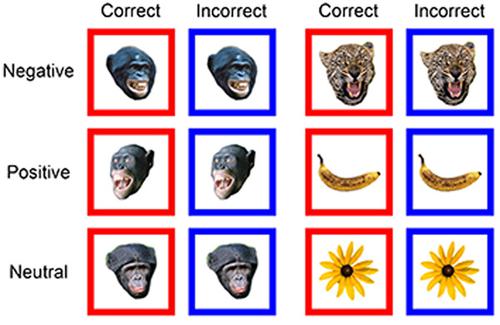当前位置:
X-MOL 学术
›
Am. J. Primatol.
›
论文详情
Our official English website, www.x-mol.net, welcomes your feedback! (Note: you will need to create a separate account there.)
Social and nonsocial stimuli alter the performance of bonobos during a pictorial emotional Stroop task
American Journal of Primatology ( IF 2.4 ) Pub Date : 2022-01-05 , DOI: 10.1002/ajp.23356 Daan W Laméris 1, 2 , Jonas Verspeek 1, 2 , Marcel Eens 1 , Jeroen M G Stevens 1, 2, 3
American Journal of Primatology ( IF 2.4 ) Pub Date : 2022-01-05 , DOI: 10.1002/ajp.23356 Daan W Laméris 1, 2 , Jonas Verspeek 1, 2 , Marcel Eens 1 , Jeroen M G Stevens 1, 2, 3
Affiliation

|
The emotional Stroop task is a paradigm commonly applied in human studies to investigate how emotionally laden stimuli interfere with cognitive processes. Recent modifications of this task have enabled researchers to study similar Stroop effects in zoo-housed primates. Across three experiments using a pictorial emotional Stroop task, we investigated if the attention of bonobos was influenced by social (facial expressions during play, conflict, and neutral events) and nonsocial stimuli (a preferred food item, predator, and flower). Four bonobos successfully learned to complete the task on a touchscreen. First, we tested the bonobos on a standard color-interference Stroop task and found that they made more errors in color-congruent trials. Second, we included facial expressions of unknown conspecifics and found that it took the bonobos longer to select targets with play facial expressions compared to neutral expressions. Last, we included objects and found that the negative, positive and neutral objects altered performance. Our findings show that the cognitive processes of bonobos are influenced by both relevant social and nonsocial stimuli. Specifically, play faces interfered with the bonobos’ attention suggesting that these facial expressions form a salient stimulus within bonobo society. Nonsocial stimuli also altered accuracy and reaction times during the task which may be explained by their evolutionary relevance. Our results help us to better understand the (socio-)emotional competencies of bonobos and how they respond to external stimuli. Future studies can further examine how a wider range of biologically relevant stimuli interfere with attentional processes in bonobos.
中文翻译:

社会和非社会刺激改变了倭黑猩猩在图形情感 Stroop 任务中的表现
情绪 Stroop 任务是人类研究中常用的一种范式,用于研究充满情绪的刺激如何干扰认知过程。最近对该任务的修改使研究人员能够在动物园里的灵长类动物中研究类似的 Stroop 效应。在使用图形情感 Stroop 任务的三个实验中,我们调查了倭黑猩猩的注意力是否受到社交(玩耍、冲突和中性事件期间的面部表情)和非社交刺激(偏好的食物、捕食者和花朵)的影响。四只倭黑猩猩成功地学会了在触摸屏上完成任务。首先,我们在标准颜色干涉 Stroop 任务中测试倭黑猩猩,发现它们在颜色一致试验中犯了更多错误。第二,我们包括了未知物种的面部表情,发现倭黑猩猩选择具有游戏面部表情的目标比中性表情花费更长的时间。最后,我们包括对象,发现消极、积极和中性的对象改变了性能。我们的研究结果表明,倭黑猩猩的认知过程受到相关社会和非社会刺激的影响。具体来说,玩耍的面孔干扰了倭黑猩猩的注意力,这表明这些面部表情在倭黑猩猩社会中形成了一种显着的刺激。非社交刺激也改变了任务期间的准确性和反应时间,这可以通过它们的进化相关性来解释。我们的研究结果帮助我们更好地了解倭黑猩猩的(社会)情感能力以及它们对外部刺激的反应。
更新日期:2022-02-10
中文翻译:

社会和非社会刺激改变了倭黑猩猩在图形情感 Stroop 任务中的表现
情绪 Stroop 任务是人类研究中常用的一种范式,用于研究充满情绪的刺激如何干扰认知过程。最近对该任务的修改使研究人员能够在动物园里的灵长类动物中研究类似的 Stroop 效应。在使用图形情感 Stroop 任务的三个实验中,我们调查了倭黑猩猩的注意力是否受到社交(玩耍、冲突和中性事件期间的面部表情)和非社交刺激(偏好的食物、捕食者和花朵)的影响。四只倭黑猩猩成功地学会了在触摸屏上完成任务。首先,我们在标准颜色干涉 Stroop 任务中测试倭黑猩猩,发现它们在颜色一致试验中犯了更多错误。第二,我们包括了未知物种的面部表情,发现倭黑猩猩选择具有游戏面部表情的目标比中性表情花费更长的时间。最后,我们包括对象,发现消极、积极和中性的对象改变了性能。我们的研究结果表明,倭黑猩猩的认知过程受到相关社会和非社会刺激的影响。具体来说,玩耍的面孔干扰了倭黑猩猩的注意力,这表明这些面部表情在倭黑猩猩社会中形成了一种显着的刺激。非社交刺激也改变了任务期间的准确性和反应时间,这可以通过它们的进化相关性来解释。我们的研究结果帮助我们更好地了解倭黑猩猩的(社会)情感能力以及它们对外部刺激的反应。



























 京公网安备 11010802027423号
京公网安备 11010802027423号